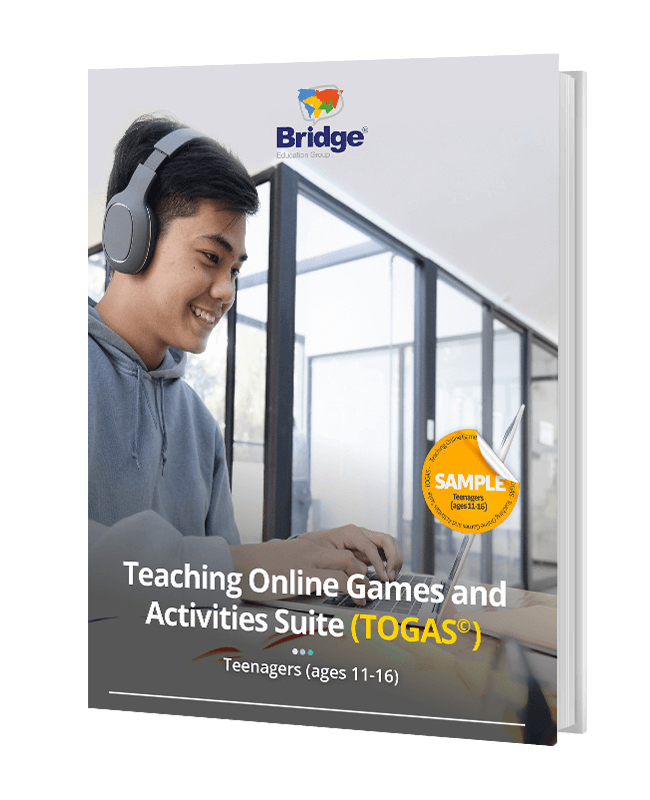Helping your students master clear and correct pronunciation will aid them in becoming better, more confident communicators when speaking English both in and out of class. These ESL pronunciation games offer ways to integrate plenty of phonics practice into your online or in-person classrooms with young learners, teens, and adults.
If you’re new to teaching, you’ll want to get initial training and qualification with a TEFL certificate. You can explore our online TEFL courses to get started!
ESL pronunciation activities for young learners
Kids tend to be enthusiastic learners who aren’t afraid to try out new sounds or mimic language. They also love opportunities to get up and move around during class activities. Let’s explore some ESL pronunciation activities that are great for young learners.
Looking to expand your training to specialize in teaching young learners? Learn more about the Specialized Certification in Teaching English to Young Learners.
ESL song sing-along
ESL songs work well to practice pronunciation with young learners. Students can move and dance with phonics songs, which helps them better retain what they’re learning. A sing-along is a simple activity for young learners and can be adapted for use with older students as well.
By learning a song in English, and practicing it over and over, students become familiar with the sounds of English and imitate the singer, practicing correct pronunciation in a fun and interactive way.
Interested in learning more about the ties between physical movement and language retention? Read about the Total Physical Response (TPR) technique.
Pronunciation bingo
One effective game for teaching ESL phonics is “Pronunciation Bingo.” To play, prepare Bingo sheets with sample words for each of the phonemes (individual sounds) you want to review. Take a sound flashcard from a bag and say the sound, such as /e/, while showing students the card. Students must find the word on their Bingo sheet that matches that sound (such as “bet”) to cross it out. This game can be played individually or in pairs.
If this is too advanced for your student’s level, you can modify the activity by saying the sound and then giving them a sample word: /e/ – let. Students must then find a word with the same sound: step.
Discover more ESL games and activities for kids and teens.
Rhyming activities
You can include some rhythmic rhyming activities in your lessons, having your students repeat after you. In the rhythm you choose, you can move and say connected rhyming pairs, such as boy/toy, toy/joy, and joy/soy. You can then switch to a new rhyming pattern.
Need more game ideas for young learners? Download the free Teaching Online Games and Activities – Young Learners (TOGAS) Sample eBook.

ESL pronunciation activities for teenagers and young adults
Teenagers and young adults may be more self-conscious than younger learners, so preparing some fun but appropriate ESL phonics games, as well as some ESL pronunciation worksheets, is a good idea. Here are some great ideas for ESL pronunciation activities for teens and young adults.
Rhyming pair memory game
After some repetition drills on the target words and sounds, you can try a “Rhyming Pair Memory Game.” Make cards with words that rhyme, like man/can, bit/sit, fame/came, and so on, and place them face down. Students take turns turning over the cards to find the pairs that rhyme.
Want to ensure class games are engaging and educational? Read the 5-Point Checklist for Planning Online ESL Games for Teens.
Teach your students to speak with confidence with the
Micro-credential in Teaching English Pronunciation
Get CertifiedCorrect the teacher
If you are teaching your students stress and intonation, you can try “Correct the Teacher.” You say a sentence in a natural or unnatural rhythm and your students have to decide if you said it correctly or incorrectly. If they say that you are wrong, they then have to say the sentence with the correct intonation.
Ready to learn more about teaching this age group? Earn a Specialized Certification in Teaching English to Teenagers.
Minimal pairs games
ESL phonics worksheets on minimal pairs are a good way to fill some minutes at the end of a lesson, or you can provide them as homework, while a “Minimal Pairs Slap Game” can keep your students engaged in a group game for the main part of the lesson. Hand out sets of flashcards to each group and tell your students to spread them out on the table. You say one word of a minimal pair, such as “cat.” The students have to find and slap the card that shows the minimal pair partner, for example, “cap.” You can extend this game to exercises on stress and intonation, and you can also let your students take turns being the person who says the word or sentence.
Looking for more ESL game ideas for teens? Download the free Teaching Online Games and Activities – Teenagers (TOGAS) Sample eBook.
ESL pronunciation games for adult students and professionals
ESL pronunciation games for adults are a great way to liven up the classroom and help your older students target specific sounds and common pronunciation errors. It’s always a good idea to use authentic materials and language from your student’s field of expertise or study to create relevant context.
For example, if you are teaching a class for students in the hospitality industry, great learning contexts may be teaching them how to pronounce flavors or items on a menu or how to explain the day’s special with the correct stress.
Here are some ESL pronunciation games for adults.
Rhyming poetry
For both live and online lessons, you can have your students write a simple rhyming poem and read it out loud in class. This activity can be used with students of all ages, ranging from beginner to advanced levels. This is a creative task that allows students to express themselves freely.
Need more ESL game ideas for your adult students? Download the free Teaching Online Games and Activities – Adults (TOGAS) Sample ebook.
Language apps
There are a variety of language tutoring applications these days that students can download to practice speaking English beyond the classroom and build important pronunciation skills. For example, FLOW Speak provides over 400 short lessons, including business lessons, so students can practice English conversations on their own time, extending learning beyond the classroom. Teachers can recommend or provide access to the app and track students’ progress on the admin dashboard. The app uses voice recording technology to generate instant, AI-powered feedback so students can keep practicing and improving. Apps like this offer easy, low-stakes speaking practice that can build students’ confidence and practical conversation skills.
Sound chain
Let your students line up or make a circle, or if you’re teaching online, let your students decide on an order. Give the key sound and have each student come up with a new word with the same sound.
You can vary this ESL pronunciation game, for example, by letting the next student repeat the previous words in the right order before adding their own, or by having your class tell a story with the words they came up with during the sound chain game, in groups or as a whole class.
This is a great way to increase student talking time. They can then write the story down in their own words as homework or during class time.
Motivate your students with this free eBook sample
Teaching Online Games and Activities – Teenagers
downloadTongue twisters
There are heaps of tongue twisters out there, for all levels and ages, that you can use in your classes. Tongue twisters for ESL students can create a very lively and fun atmosphere, as everybody tries to do their best but eventually gets twisted up in their own words and speed. This ESL pronunciation activity is good for team building and for students who are comfortable with each other and with you.
Pronunciation is an important aspect of any ESL curriculum. You can make this otherwise challenging skill fun and ensure student progress by incorporating ESL pronunciation games into your classroom!













